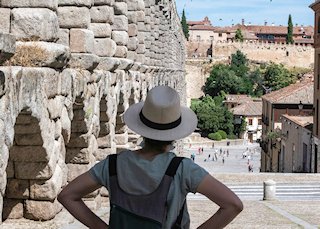Travel Notes: Destinations: Africa: South Africa - Kruger National Park Visitor Guide - Kruger National Park Tours & Trips.
Short URL: https://tnot.es/MQP
Travel Guide For Visitors to Kruger National Park
From game drives that reveal the legendary Big Five to hidden waterholes where elephants gather at sunset, Kruger delivers exceptional safari experiences. Share on Facebook
Hear The Lion's Roar
Imagine waking up to the distant roar of a lion echoing across the African savannah.
This isn't a David Attenborough documentary; it's what awaits you at Kruger National Park.
 Add a Business -
Add a Location -
Add a Lodging - Add Travel Content
- Add URL
- Travel Services.
Add a Business -
Add a Location -
Add a Lodging - Add Travel Content
- Add URL
- Travel Services.
Enjoying a Kruger Park Wildlife Safari
Whether you're a first-time safari-goer or a seasoned wildlife enthusiast, this South Africa's Kruger National Park promises encounters that will leave you utterly speechless.
Why Kruger National Park Should Top Your Travel Bucket List
Kruger National Park offers a wildlife experience that ranks with the best in Africa, spanning an area larger than Wales across Limpopo and Mpumalanga provinces.
This isn't your average zoo experience; it's raw, authentic Africa where wildlife roams freely across diverse ecosystems.
What Sets Kruger Apart
What sets Kruger apart is its incredible accessibility compared to other African safari destinations.
You can self-drive through the park, stay in comfortable rest camps, or opt for guided safaris that unlock the secrets of the bush.
The park's excellent infrastructure means you can focus on what matters most; witnessing incredible wildlife moments.
The Big Five and Beyond - What Wildlife Awaits
Meeting the Magnificent Big Five
The Big Five (lion, leopard, elephant, buffalo, and rhino) remain the highlight sightings of any Kruger safari.
The park boasts an estimated 1,500 lions, 17,000 elephants, 48,000 buffalo, and 1,000 leopards; making your chances of spotting these incredible creatures remarkably high.
On an average three-day safari, three-quarters of visitors report Big Five sightings, though remember that wildlife doesn't follow timetables.
The thrill lies in the unexpected; that moment when a leopard emerges from the shadows, or a herd of elephants crosses your path; raising their trunks as they let out a trumpeting sound to greet you.
Wildlife Beyond the Big Five
Kruger's biodiversity extends far beyond its famous five.
You'll encounter graceful giraffes stretching their necks towards acacia trees, zebras creating natural art with their stripes, and hippos lazing in muddy waterholes.
The park hosts over 500 bird species, making it a paradise for birdwatchers seeking everything from colourful bee-eaters to the mighty martial eagle.
Don't overlook the smaller creatures either.
Wild dogs, one of Africa's most endangered predators, roam Kruger's plains, while cheetahs showcase their incredible speed across open grasslands.
When to Visit Kruger National Park
Dry Season (May to September) - Prime Wildlife Viewing
The dry season (May to September) is usually regarded as the best time to visit Kruger.
Skies are normally clear, wildlife viewing is at a premium and it is low season.
During these months, animals congregate around water sources, making game viewing more predictable and rewarding.
The cooler temperatures make game drives more comfortable, and with less vegetation obscuring sightlines, spotting wildlife becomes significantly easier. This period also coincides with fewer crowds and potentially better accommodation rates.
Wet Season (October to April) - Green Season Adventures
The summer months bring lush landscapes and dramatic thunderstorms that transform Kruger into a green paradise.
While game viewing can be more challenging due to thick vegetation, this season offers unique experiences like newborn animals taking their first steps and incredible birdwatching opportunities.
The weather can be hot and humid, but afternoon thunderstorms provide spectacular light shows across the African sky.
Kruger National Park Entry Fees and Practical Information
Entrance Fees
Planning your budget requires understanding the current gate fees.
International visitors pay R535 per day for adults and R267 for children under 12, while South African residents enjoy significantly reduced rates.
Getting There
Kruger National Park is approximately a 5-6 hour drive from Johannesburg, making it easily accessible for both local and international visitors.
Multiple entrance gates provide access to different sections of the park, with the southern regions typically busier than the remote northern areas.
International visitors should ensure their passport remains valid for at least 30 days beyond their departure date and contains at least two blank pages for immigration stamps.
Accommodation Options in Kruger
Private Lodges - Ultimate Luxury Safari Experience
For those seeking premium experiences, private lodges bordering Kruger offer exclusive game drives, expert guides, and luxury amenities.
These lodges provide access to pristine wilderness areas with fewer vehicles, creating more intimate wildlife encounters.
Rest Camps - Comfort in the Wilderness
SANParks operates various rest camps throughout Kruger, ranging from basic facilities to more luxurious options.
These camps provide secure accommodation within the park boundaries, allowing you to hear the sounds of the African night from your doorstep.
Popular rest camps include Skukuza (the largest and most comprehensive), Satara (excellent for game viewing), and Berg-en-Dal (perfect for rhino sightings).
Book well in advance, especially during peak season.
Self-Catering and Camping
Budget-conscious travellers can choose camping options or self-catering chalets within rest camps.
This approach allows you to experience Kruger affordably while maintaining the authentic safari atmosphere.
Popular Hotels in Mbombela (Nelspruit)
Tourist Map of Nelspruit
Use the Tourist Map of Nelspruit to help you decide where to stay in Nelspruit based on travel budget, preferred location, planned must-see attractions and local must-do activities.
Safari Activities and Game Drives
Guided Game Drives
Professional guides bring Kruger to life through their extensive knowledge of animal behaviour, tracking skills, and conservation insights.
Morning and evening game drives often provide the best wildlife viewing opportunities when animals are most active.
Night Drives
Some rest camps offer night drives that reveal Kruger's nocturnal residents.
Leopards become more active after dark, while smaller predators like genets and civets emerge from their daytime hideouts.
Self-Drive Safaris
One of Kruger's unique features is the ability to explore independently.
Well-maintained roads wind through different habitats, from riverine forests to open grasslands.
Self-driving offers complete flexibility to spend as much time as desired at each sighting.
Remember to maintain safe following distances from animals and never exit your vehicle outside designated areas.
Walking Safaris
For the adventurous, guided walking safaris offer an entirely different perspective on the African bush.
These experiences focus on smaller details; animal tracks, medicinal plants, and the intricate ecosystem that supports Kruger's larger inhabitants.
Conservation and Responsible Tourism
Responsible Safari Practices
Respect wildlife by maintaining appropriate distances, keeping noise levels down, and never attempting to attract animals' attention.
Stay on designated roads and tracks to minimise environmental impact.
Support local communities by purchasing crafts and souvenirs from authorised vendors, and consider extending your stay to explore surrounding areas that benefit from conservation tourism.
Supporting Wildlife Conservation
Every visitor to the Kruger National Park pays a conservation fee for every day spent inside the Park to help conserve the park's natural and cultural heritage.
Your visit directly contributes to anti-poaching efforts, habitat restoration, and community development programmes.
Planning Your Kruger National Park Adventure
Booking and Reservations
Kruger's popularity means accommodation books up months in advance, particularly during school holidays and peak wildlife seasons.
Plan early and remain flexible with dates to secure your preferred options.
Essential Packing List
Pack neutral-coloured clothing to blend with the environment, comfortable walking shoes, a wide-brimmed hat, and high SPF sunscreen.
Don't forget binoculars for enhanced game viewing and a quality camera with spare batteries.
Malaria precautions are essential, so consult your healthcare provider regarding appropriate prophylaxis and bring insect repellent.
Wild Card Membership
Consider purchasing the Wild Card if planning multiple visits to South African national parks; it offers excellent value for frequent visitors.
Wild Card Membership gives you one year’s unlimited entry to 80+ National Parks, Reserves and Resorts around Southern Africa, depending on the membership cluster and category that you choose.
Beyond Kruger - Extending Your South African Adventure
Local Communities
Engage with local communities around Kruger to understand the complex relationship between conservation and rural livelihoods.
Many communities offer cultural experiences that enrich your understanding of the region.
Panorama Route
Combine your Kruger Safari with the spectacular Panorama Route, featuring Blyde River Canyon, God's Window, and Bourke's Luck Potholes.
This scenic drive showcases South Africa's dramatic landscapes and cultural heritage.
Making the Most of Your Kruger Experience
Success in Kruger requires patience, realistic expectations, and an appreciation for the entire ecosystem rather than focusing solely on big game sightings.
Every moment in the African bush offers something special; from dung beetles industriously rolling their treasures to the intricate social dynamics of elephant herds.
Wake up early, stay late during game drives, and embrace the unexpected.
The most memorable safari moments often come from chance encounters rather than planned activities.
Keep your camera ready, your voices low, and your sense of wonder fully engaged.
Kruger National Park represents more than a holiday destination; it's a chance to connect with nature in its rawest form and contribute to one of Africa's greatest conservation success stories.
Whether you spot all of the Big Five or find yourself enchanted by a family of warthogs, you'll leave with memories that last a lifetime and a deeper appreciation for the incredible diversity of African wildlife.
More City Travel Guides
Cities in Africa - Cities in America - Cities in Asia - Cities in Australasia - Cities in Latin America - European Destinations - Middle East.
More From Travel Notes
Travel Notes Online Guide to Travel
Africa - Asia - Caribbean - Europe - Middle East - North America - Oceania - South America.
The Travel Notes Online Guide to Travel helps visitors plan their trip with country and city travel guides, local tourist information, reviewed web sites, and inspiring travel content.
Travel and Tourism Guides on Travel Notes
 If you find Travel Notes useful, please take a moment to
like us on Facebook and share with your friends on social media.
If you find Travel Notes useful, please take a moment to
like us on Facebook and share with your friends on social media.
Share on Facebook
Travel Resources
.
Travel & Tourism With Industry Professionals.











